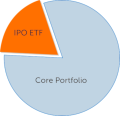Biotechs are among the most risky of IPOs due to the binary nature of the success… or failure of their drugs. In the past, most biotechs delayed public offerings until they at least showed clinical evidence of their safety or efficacy.
But in 2018, biotechs are increasingly going public with little or no clinical data. Instead, IPO investors are asked to rely on theories, cartoons of molecules and mouse models.
Two early-stage biotechs plan to price IPOs this week. Abpro (ABP) is preclinical, bringing the number of preclinical 2018 biotech IPOs up to four, compared to just one during all of 2017 (Denali Therapeutics, DNLI, in December). The week's other biotech, Evelo (EVLO), disclosed its first human dosing just a few weeks ago. And another preclinical biotech - Scholar Rock (SRRK) - is on track for an IPO later this month.
Early-stage biotechs have more opportunities for failure. Without Phase 1 data, a drug candidate can immediately prove unsafe or fail in human proof of concept.
A number of factors are fueling the year's biotech IPO activity, including substantial insider buying, large biotech M&A, and outsized returns from 2017 biotech IPOs.
| Upcoming Early-Stage Biotech IPOs |
|||
|---|---|---|---|
| Issuer Business |
Indication Progress |
IPO Proceeds IPO Mkt Cap |
Pricing Date |
| Evelo Biosciences (EVLO) |
Inflammation Phase 1 initiated |
$85M $563M |
IPO PRO ONLY |
| Abpro (ABP) |
Cancer Preclinical |
$60M $305M |
IPO PRO ONLY |
| Scholar Rock (SRRK) |
Spinal muscular atrophy Preclinical |
$75M TBA |
IPO PRO ONLY |
2018 Biotech IPOs Have Underperformed
While last year’s biotechs average a 70% return, this year’s biotechs average a gain of just 6%, with only 38% trading above issue. The three preclinical biotechs from 2018 average a return of 13%. However, the stocks are often highly volatile for the years leading up to their approval or rejection. Solid Biosciences is illustrative of this volatility: in the four months since the IPO, its return has ranged from +107% to -55%.
| Preclinical Biotech IPOs 2017-2018 | ||||
|---|---|---|---|---|
| Biotech | Drug type Indication |
IPO Date | IPO Proceeds IPO Mkt Cap |
1st Day Return 5/7/18 Return |
| Unity Biotechnology (UBX) | Small molecule Aging diseases |
05/02/18 | $85M $787M |
-2% -4% |
| Homology Medicines (FIXX) | Gene therapy Rare diseases |
03/27/18 | $144M $602M |
17% 32% |
| Solid Biosciences (SLDB) | Gene therapy Rare diseases |
01/25/18 | $125M $574M |
41% 11% |
| Denali Therapeutics (DNLI) |
Small molecule Alzheimer's |
12/07/17 | $250M $1,679M |
19% 7% |
Perform screens for recent Health Care IPOs or recent Venture Capital exits on IPO Pro. Sign up for a free trial.
Early-Stage But Not Cheap
Unity, Homology and Solid are among the year’s five largest biotechs by market cap. Last year's Denali Therapeutics (DNLI) was the largest biotech to IPO in 2017 with a $1.7 billion valuation. Preclinical biotech IPOs often target markets so large that an approval would make the current valuation irrelevant. However, IPO investors should be cautious of paying more for companies that have proven less.
Some Early Stage Biotechs Have Been the IPO Market’s Top Performers
The wave of preclinical biotechs in 2018 may have been spurred by a number of early-stage biotech IPOs during 2014-2017 that became highly successful. AnaptysBio (ANAB), an early-stage developer of antibodies for inflammatory conditions, is the best-performing biotech of 2017, up 495% from its IPO (though it had been +750% as recently as March). AveXis (AVXS), an early-stage gene therapy biotech targeting spinal muscular atrophy, was recently acquired at a 987% premium to its 2016 IPO price. Cancer biotech Loxo Oncology (LOXO) is up 850% from its 2014 IPO. Other early-stage IPOs with outsized returns include Audentes Therapeutics (BOLD), WAVE Life Sciences (WVE) and Blueprint Medicines (BPMC).
Additionally, a trio of preclinical gene-editing biotechs went public in 2016: Editas Medicine (EDIT; 110% from IPO), Intellia Therapeutics (NTLA; +21%) and CRISPR Therapeutics (CRSP; +269%).


